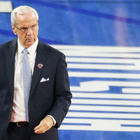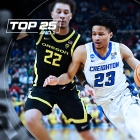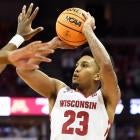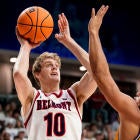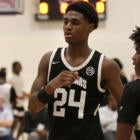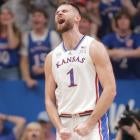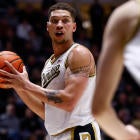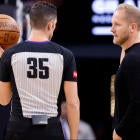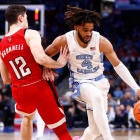Whatever North Carolina is paying lawyer Rick Evrard on its NCAA case, it's not enough. North Carolina is running circles around the NCAA that amounts to the start of a victory lap.
The NCAA has mishandled this case so thoroughly and for so long that North Carolina can argue with a straight face that the worst academic fraud case in college sports history isn't subject to NCAA jurisdiction. If that's true, why is the NCAA even involved in academics at all?
"As a lawyer, I have great admiration for really creative lawyering," said retired North Carolina Supreme Court Justice Bob Orr, co-counsel in a lawsuit against the NCAA and North Carolina over the school's fake classes that disproportionately involved athletes. "Rick and his team have made a huge amount of money and done a really good job."
UNC's response this week to the NCAA's second notice of allegations argued that the charges of lack of institutional control and failure to monitor are without merit. UNC said the NCAA knew years ago that the African and Afro-American Studies courses in question had irregular class meeting times, lacked professor oversight and included grading irregularities; and yet, the NCAA chose in the past to do nothing about them.
"Ultimately, the NCAA concluded that it had conducted a sufficient investigation, that no NCAA bylaws had been violated by academic irregularities in the Department, and that the Notice of Allegations did not need to be amended," UNC's lawyers wrote.
This is clever lawyering with some legitimate points about the NCAA process. Keep in mind, North Carolina and NCAA are co-defendants in a lawsuit in which the NCAA argues it has no legal responsibility for the academic fraud at UNC. The case has been waiting for months for a North Carolina federal judge to rule on the defendants' motions to dismiss.
Who knows what negotiations have occurred behind the scenes between UNC and the NCAA? The NCAA made an unusual decision a couple months ago to issue a second notice of allegations (football and men's basketball were removed entirely by name as beneficiaries of the classes). Forget about UNC suggesting self-imposed penalties this week. UNC's response skipped right over that and included the bold step of challenging the dreaded "lack of institutional control" label.
"Rick is pretty smart and he's been doing this for a long time," said David Ridpath, a former Marshall compliance officer who closely follows the NCAA as a sports administration professor at Ohio University. "I think there's a lot of talk behind the scenes. North Carolina likely doesn't go forward with that response unless they're reasonably sure they're going to get most of what they're asking for. He has put forth, sadly, a pretty decent strategy."
The NCAA hasn't talked about this process since the case is pending. What it looks like is the NCAA wants to punish UNC just enough to show it knows this was bad while agreeing with UNC that it doesn't really have oversight of academics at universities.
"They all know the argument that the NCAA has no jurisdiction over academics flies completely against everything that's in their bylaws," Orr said.
If, as North Carolina argues, the NCAA has no jurisdiction over academic irregularities in college courses, it begs the question: Why can the NCAA Clearinghouse withhold initial eligibility for players based on their high school transcript and curriculum? If the NCAA has the authority to require a prep school to send a player's syllabus and class attendance information, is the NCAA going to agree with UNC that it has no authority over widespread irregular classes once the recruit goes to college?
"My main issue is either you're in or you're out with academics," Ridpath said. "This case speaks squarely to extra benefits and academic fraud to keep athletes eligible. This is as bad a case as there has ever been. The NCAA has to make a decision. You can't say we're going to dictate admission policies and satisfactory progress toward a degree but pass on what may or may not be fraudulent activity.
"I'm fine if the NCAA gets out of academics entirely. The NCAA does a really good job running championships. This is where I agree with (ESPN analyst) Jay Bilas' argument: They need to get completely out of academics and let the chips fall where they may. If the institution says we're going to bring everyone in that we can in order win and boost revenue, and if their boosters and accrediting institutions don't have a problem with it, at the end of the day, why should we care?"
"Why should we care?" That's the question the NCAA fears in the UNC case because the answer is frightening to the NCAA. The NCAA's entire enterprise is designed around the notion that providing access to an education is sufficient payment to players for their participation in a multi-billion dollar industry. To be clear: Many college athletes do get a fine education and a scholarship does have value (although not always as much value to certain players as they could make if they were allowed to be paid).
Terrific reporting through the years by the Raleigh News & Observer uncovered fraudulent classes taken by star UNC basketball players, among others. Sure, no one wants college athletes to receive a bogus education. But no one exactly stopped watching Tar Heels hoops games once they found out, did they?
"It's really a brash position UNC is taking (in its response to the NCAA), and it's a great question whether the NCAA should get out (of academics entirely)," Orr said. "Here's the thing: Nobody has any confidence that the schools will do their jobs so that's why they've thrown it on the NCAA for years to police academics. Maybe we've just reached the point where if a university is going to cheat academically, the public needs to look to the university and university leadership and say, 'Does winning mean that much to you?' Instead, they turn to this outside organization with inconsistent standards and limited resources."
Let's not forget what Kenneth Wainstein concluded about UNC in his 2014 report, which, unlike the NCAA investigation, included interviews with the key people who organized these fake classes. Federal indictments made people talk to Wainstein; NCAA investigations didn't do the same. Among the findings by Wainstein, a former top U.S. Justice Department official:
- UNC athletes made up 47.4 percent of the more than 3,100 students who took the fake classes over 18 years. Athletes comprised 4 percent of the university student body.
- Ten of the 15 players on UNC's 2005 national championship men's basketball team were majors in the Department of African and Afro-American Studies. Wayne Walden, the basketball team's academic counselor who came from Kansas with Roy Williams, told investigators he knew of the class irregularities.
- A number of athletes were "steered" to the fake classes by academic counselors in North Carolina's athletic department because they saw the courses as "GPA boosters" to stay eligible under NCAA and UNC rules. Some counselors suggested what specific grades should be awarded to players.
- There was even a PowerPoint presentation in 2009 by two football academic counselors to UNC's football staff warning them of what retirement of Debbie Crowder, the student services manager of the African-American Studies department, would mean for some players. One slide explicitly said the counselors put players in courses in which they didn't go to class, didn't take notes or have to stay awake, didn't have to meet with professors, and didn't have to "pay attention or necessarily engage with the material."
North Carolina continues to acknowledge this scandal was bad -- really bad -- but argues it's for the university to deal with regarding its reputation and accreditation. Essentially, one of the finest institutions of higher education in America is telling the NCAA to stay out of its academic business (or, at least, this type of academic business).
And UNC isn't alone. Because of membership concerns, the NCAA recently rewrote its bylaws regarding academic misconduct that both broadens and narrows the scope to go after schools. It's now possible for the NCAA to make a charge of impermissible academic assistance by a university staff member even if a player's eligibility isn't affected. But the bar to bring an impermissible academic assistance charge became very high.
Universities basically want it both ways. They want to control what's defined as academic fraud on their campuses and they expect the NCAA to make a violation charge if the school's investigation produced an absurd result. The schools don't truly want the NCAA to dig into how some athletes are getting educated. Finding too many academic fraud cases isn't good for business and schools never know when it's their turn to call Rick Evrard for help.
Some conference commissioners have even voiced consideration about eliminating NCAA initial eligibility standards. While very few people seem interested in this idea, Big 12 commissioner Bob Bowlsby laid out a suggestion in January of tying initial scholarships available to a team to graduation rates. The idea would be to incentivize graduation.
Meanwhile, UNC's lawyers are expertly reminding the NCAA infractions committee of the dangers of moving the goal posts for penalties.
"There have been statements made, numerous articles written, and intense and widespread speculation about this case during the past five years," UNC's lawyers wrote to the NCAA this week. "The temptation to use public speculation and other unverified information is a very real part of this case. The University believes that it is vital that only information that is in the record, as defined in the (committee on infraction's) internal operating procedures ... be used to evaluate the conduct, behavior, and institutional responsibility related to this case."
Translation to the NCAA: "Remember the Penn State penalties you rolled back after getting sued? We do."
Ultimately, the NCAA infractions committee will decide UNC's penalties, likely sometime in 2017. The Tar Heels' women's basketball team will likely get slammed since it's the only program identified by name in the notice of allegations.
The NCAA gave UNC breathing room with its second notice of allegations. UNC ran with it to start a victory lap that raises more questions of why the NCAA even tries to race in this academic world.












